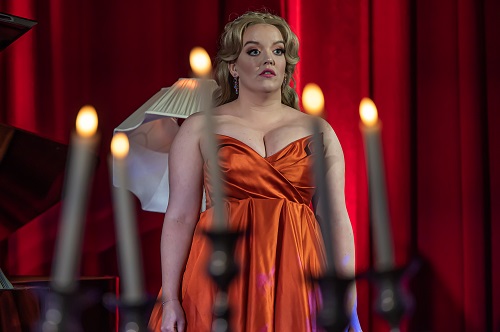 United Kingdom Berlioz, Les nuits d’éte (Summer Nights): Sinead O’Kelly (mezzo-soprano), Bryan Evans (piano), Cameron Menzies (creatives). Courtyard Theatre, Newtownabbey, 11.3.2023. (RB)
United Kingdom Berlioz, Les nuits d’éte (Summer Nights): Sinead O’Kelly (mezzo-soprano), Bryan Evans (piano), Cameron Menzies (creatives). Courtyard Theatre, Newtownabbey, 11.3.2023. (RB)

This was the final concert in Northern Ireland Opera’s Salon Series which involved them performing a range of repertoire in various venues across Northern Ireland. The venue on this occasion was the small and intimate Courtyard Theatre in Newtownabbey which is just outside Belfast.
The sole work on the programme was Berlioz’s Les nuits d’éte which the composer wrote in 1841. It is a setting of six poems by the French poet and writer Théophile Gautier. Each of the six songs is dedicated to different singers. The first and last songs are bright and upbeat and deal with the birth of love and with lovers being reunited. They frame four darker, more introspective songs which look at difficult feelings stemming from relationships and the loss of loved ones.
Cameron Menzies used carpets and lamps to create a warm domestic setting for the songs. Roses featured prominently on the set and rose petals were sprinkled across the floor. Sinead O’Kelly was wearing a fine burnt-orange gown and she made good use of the props while performing the songs.

There was much to admire in this performance by Sinead O’Kelly and Bryan Evans. They adopted brisk tempi and did an excellent job characterising each of the songs. O’Kelly brought a bright, radiant tone to ‘Villanelle’, the opening song of the set, against Evans’s chattering chords on the piano. ‘Le spectre de la rose’ is the masterpiece of the set; the poet imagines a rose corsage worn by a young woman that is now dying. O’Kelly’s tone was rich and varied while Evans accompanied beautifully with a range of shifting textures. I wondered if there was scope to bring out more of the sensual ardour and shimmering eroticism of this song. ‘Sur les lagunes’ is a funereal barcarolle which sees the poet heading out to sea. O’Kelly captured the feelings of grief for lost love in the early part of the song and the anguished dramatic outbursts were handled well.
In ‘Absence’ O’Kelly’s phrasing was immaculate and the tone was nicely varied although this performance did not move me as much as others I have heard, particularly in those sections where when the poet pleads for the return of his beloved. Evans captured perfectly the ghostly backdrop of ‘Au cimetière’ while O’Kelly’s vocal line brought home the melancholy of the graveyard scene. O’Kelly and Evans ended the cycle on a more upbeat note with ‘L’Île inconnue’. O’Kelly brought the scene winningly to life and sang with vivacity and charm.
O’Kelly performed the first of the songs again as an encore which was well received although I did feel the audience was a little short-changed in this concert given there was only one work on the programme. I noticed that an additional song by Chausson was originally programmed and it would be good to include this when the concert is repeated in other locations.
It was an inspired idea to hold this series of concerts across different venues in Northern Ireland and I have been very impressed with the overall quality of the productions and the standard of the music making. Bravo to Cameron Menzies and his team for pulling the series together in such an imaginative way.
Robert Beattie